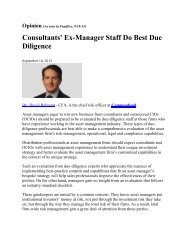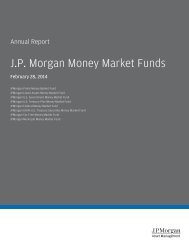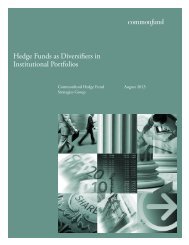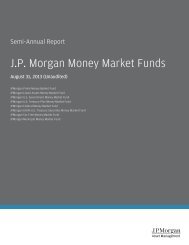The Investment Policy Statement - Commonfund
The Investment Policy Statement - Commonfund
The Investment Policy Statement - Commonfund
Create successful ePaper yourself
Turn your PDF publications into a flip-book with our unique Google optimized e-Paper software.
Delegation to a committee, a consultant, or a manager. Delegation of the trustees’<br />
responsibilities with respect to a particular fund is permitted under UPMIFA, unless<br />
prohibited by the donor. 4 Under this standard, the board can delegate its fiduciary<br />
responsibility for investment matters to a committee or to outside advisors, but<br />
must exercise prudence in doing so. 5 Upon accepting the delegation, the new<br />
fiduciaries are bound by the same standard as the trustees in carrying out their<br />
new responsibilities. And if an investment committee or similar body is to be<br />
created, the committee chair (who should be a trustee) should seek out members –<br />
whether trustees or not – who have sufficient skill, experience and commitment<br />
to be good fiduciaries for the pool. All of these actions should be evidenced by<br />
appropriate board discussion and action, and recorded in the minutes.<br />
What is the right size for an investment committee, and what kind of individuals<br />
should be asked to serve? Data taken from the most recent NACUBO-<strong>Commonfund</strong><br />
Study of Endowments and <strong>Commonfund</strong> Benchmarks Studies 6 show that the investment<br />
committees of educational institutions, operating charities and nonprofit healthcare<br />
organizations number about 8 voting members on average. Foundations have smaller<br />
committees of around 6 voting members, since for many foundations the committee<br />
is composed of the founder’s family and a few outside advisors. Within the investment<br />
committee, around 4 or 5 members are investment professionals (for foundations,<br />
the number of investment professionals is around 3). Between 2 and 3 members<br />
across all types of institution have alternative strategies experience, a key requirement<br />
for fiduciaries of highly diversified portfolios.<br />
It is thus apparent that in recruiting trustees, investment committee members, and<br />
others who will have responsibility for managing endowment funds, care must be<br />
taken to select individuals who will understand and be able to fulfill their duties as<br />
fiduciaries and will bring their particular skills to bear in overseeing or managing the<br />
funds. It is important to note that, while UPMIFA does not set a minimum standard<br />
for those to whom the responsibility is delegated, it does require that the board, in<br />
choosing those individuals, act prudently. 7 Thus, sound investment policy would<br />
indicate that those to whom the responsibility for managing institutional funds is<br />
assigned (whether trustees or others) should, at a minimum, have some familiarity<br />
with and experience in investment management.<br />
4<br />
Ibid. § 5(a), p. 29.<br />
5<br />
Ibid.<br />
6<br />
Citations are to data for FY2010 drawn from the NACUBO-<strong>Commonfund</strong> Study of Endowments (NCSE) and the<br />
<strong>Commonfund</strong> Benchmarks Study volumes on foundations, operating charities and healthcare organizations.<br />
7<br />
Ibid.<br />
©2011 COMMONFUND 5













